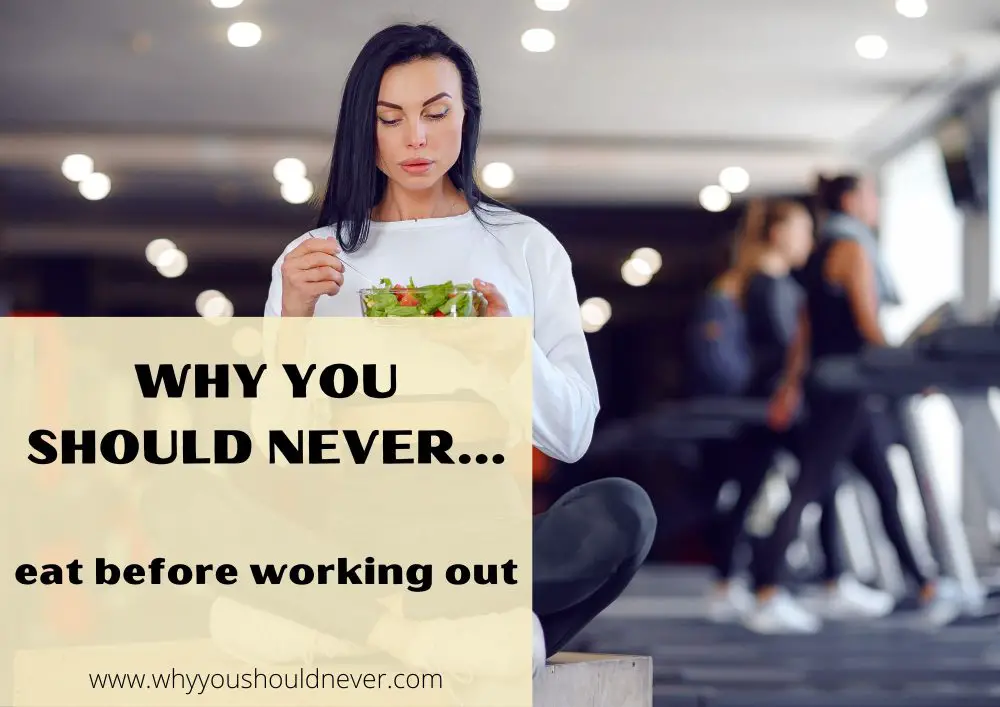![]()
Why You Should Never Eat Before Working Out
Working out takes a lot out of your body. Your muscles burn, your heart rate spikes, and you become a sweaty mess in no time. All that exertion requires energy, which is why most people fuel up with a pre-workout meal.
Carbohydrate and protein-loading before exercising has been recommended by trainers and fitness enthusiasts for years, but is it really a good idea to fill your stomach before hitting the gym? Let’s explore.
8 reasons why you shouldn’t eat before working out
1. Digestion takes energy
When you eat, your body has to work hard to break down the food and absorb nutrients. This process can take hours, especially if you’ve eaten a heavy meal.
If you exercise too soon after eating, your body will have to divert blood flow away from your muscles and towards your digestive system in order to aid digestion.
2. Bloating
Eating before a workout can leave you feeling bloated and uncomfortable during exercise. This is particularly true if you’ve eaten foods that are high in fiber, fat or protein. These types of foods take longer to digest and can cause gas and bloating.
3. Cramping
Exercising with a full stomach can also lead to cramps, especially if you’re doing high-intensity workouts like running or spinning. This is because, as previously mentioned, your body has to divert blood flow away from your muscles in order to aid digestion, which can cause muscle cramps.
4. Nausea
Many people experience nausea when they work out on a full stomach. This is because the physical activity sends blood to your muscles, leaving less for digestion and causing food to sit in your stomach undigested.
Thus, you might find yourself feeling queasy, lightheaded or even vomiting if you exercise too soon after eating.
5. Sluggishness
You know exactly what it’s like after you’ve eaten a heavy meal – you want to hit the hay and drift off into dreamland. That’s your body’s natural response to digestion.
If you eat before working out, your body will be otherwise engaged in trying to digest your food, which will leave you feeling sluggish and low on energy. And because of this, your workout won’t be as effective.
6. Decreased fat burn
When you eat, your body releases insulin to help regulate blood sugar levels and store excess glucose as glycogen in the liver and muscles.
If you exercise too soon after eating, especially if it’s a high-carb meal or snack, your body will use that newly stored glycogen for energy instead of tapping into its fat reserves – and burning fat is what most people want to achieve when they work out.
7. Dehydration
Digesting food requires water; so if you eat before working out, your body will use up some of the water that it would otherwise need for hydration during exercise. This can lead to dehydration and make your workout more difficult.
8. It’s not necessary
Many people believe that they need to eat before working out in order to have the energy for exercise. However, unless you’re doing a very long or intense workout (such as running a marathon), your body has enough stored glycogen and fat reserves to fuel itself without needing an extra meal.
In fact, some studies have shown that exercising on an empty stomach can actually increase fat burn and improve insulin sensitivity – making it easier for your body to use glucose more efficiently and prevent diabetes.
In conclusion
Look, no one’s saying that you should be working out on a completely empty stomach, just that you might want to consider waiting a little while after eating before hitting the gym. Even breaking for a short amount of time can make a big difference in how you feel and perform during exercise.
Ultimately, though, you should listen to your body. It usually knows what’s best for it.
